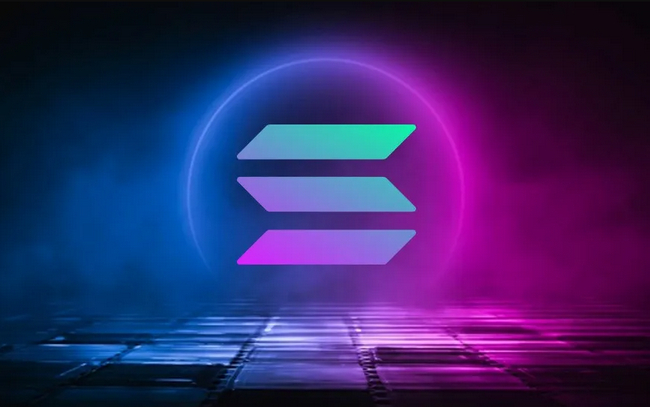-
 Bitcoin
Bitcoin $98,869.1199
2.47% -
 Ethereum
Ethereum $1,905.2352
4.19% -
 Tether USDt
Tether USDt $1.0000
0.00% -
 XRP
XRP $2.1729
1.94% -
 BNB
BNB $610.6637
1.31% -
 Solana
Solana $150.4673
3.24% -
 USDC
USDC $1.0000
-0.02% -
 Dogecoin
Dogecoin $0.1803
4.83% -
 Cardano
Cardano $0.7061
4.71% -
 TRON
TRON $0.2500
2.49% -
 Sui
Sui $3.6112
7.89% -
 Chainlink
Chainlink $14.5262
5.04% -
 Avalanche
Avalanche $20.6617
4.99% -
 Stellar
Stellar $0.2688
3.21% -
 Bitcoin Cash
Bitcoin Cash $417.4920
13.12% -
 UNUS SED LEO
UNUS SED LEO $8.8055
0.87% -
 Shiba Inu
Shiba Inu $0.0...01327
4.50% -
 Hedera
Hedera $0.1835
4.76% -
 Toncoin
Toncoin $3.1035
3.84% -
 Hyperliquid
Hyperliquid $21.6624
3.58% -
 Litecoin
Litecoin $91.5914
-0.07% -
 Polkadot
Polkadot $4.2429
7.72% -
 Dai
Dai $1.0001
0.01% -
 Monero
Monero $284.2288
-0.93% -
 Bitget Token
Bitget Token $4.2805
-0.84% -
 Ethena USDe
Ethena USDe $1.0005
0.01% -
 Pi
Pi $0.6234
7.31% -
 Pepe
Pepe $0.0...08726
8.87% -
 Bittensor
Bittensor $395.6721
8.25% -
 Uniswap
Uniswap $5.1256
4.79%
will solana outperform ethereum
Solana's advantages in speed, scalability, cost, and security position it as a potential contender to Ethereum's dominance in the blockchain landscape.
Nov 06, 2024 at 08:50 am

Will Solana Outperform Ethereum?
Introduction
Solana and Ethereum are two of the most popular blockchains in the world. Both platforms offer a variety of features and capabilities, but they also have some key differences. In this article, we will compare Solana and Ethereum on a number of factors, including transaction speed, scalability, cost, and security. We will also discuss the potential for Solana to outperform Ethereum in the future.
Key Differences Between Solana and Ethereum
1. Transaction Speed
Solana is significantly faster than Ethereum. Solana can process up to 50,000 transactions per second (TPS), while Ethereum can only process about 15 TPS. This difference in speed is due to Solana's unique architecture, which uses a combination of Proof-of-History (PoH) and Proof-of-Stake (PoS) consensus mechanisms.
2. Scalability
Solana is also more scalable than Ethereum. Solana can handle a much larger number of transactions than Ethereum, without sacrificing speed or decentralization. This is because Solana uses a sharding mechanism to divide the network into smaller, more manageable pieces.
3. Cost
Solana is cheaper to use than Ethereum. The cost of a transaction on Solana is typically around $0.00025, while the cost of a transaction on Ethereum is typically around $0.01. This difference in cost is due to Solana's more efficient architecture and its use of a native token (SOL) for gas fees.
4. Security
Both Solana and Ethereum are considered to be secure blockchains. However, Solana has a few unique security features that Ethereum does not have. For example, Solana uses a unique "Proof-of-History" consensus mechanism that makes it difficult for attackers to manipulate the network.
Potential for Solana to Outperform Ethereum
Solana has a number of advantages over Ethereum, including faster transaction speed, greater scalability, lower cost, and enhanced security. These advantages could potentially allow Solana to outperform Ethereum in the future.
However, it is important to note that Ethereum is a well-established blockchain with a large community of developers and users. Ethereum is also home to a number of popular decentralized applications (dApps), such as Uniswap and Aave. This gives Ethereum a significant advantage over Solana in terms of network effects.
Conclusion
It is difficult to say definitively whether Solana will outperform Ethereum in the future. However, Solana has a number of advantages over Ethereum, including faster transaction speed, greater scalability, lower cost, and enhanced security. These advantages could potentially allow Solana to gain market share from Ethereum in the future.
Disclaimer:info@kdj.com
The information provided is not trading advice. kdj.com does not assume any responsibility for any investments made based on the information provided in this article. Cryptocurrencies are highly volatile and it is highly recommended that you invest with caution after thorough research!
If you believe that the content used on this website infringes your copyright, please contact us immediately (info@kdj.com) and we will delete it promptly.
- Pi (PI) Token Price Prediction: Will It Break Out of Its Tight Consolidation Range?
- 2025-05-08 14:05:13
- Robert Kiyosaki Says Bitcoin Beats Gold and Silver for One Simple Reason
- 2025-05-08 14:05:13
- Coinbase Published 10,000+ Documents Revealing New Insights into the SEC's Internal Discussions Around ETH and XRP
- 2025-05-08 14:00:21
- Bitcoin Climbs After Fed Holds Interest Rates Steady
- 2025-05-08 14:00:21
- US Sweepstakes Casino News Update: What You Need to Know Right Now
- 2025-05-08 13:55:13
- HBAR is gaining bullish strength amid overall market recovery from its weeks of volatility.
- 2025-05-08 13:55:13
Related knowledge

What is Ethereum’s Slashing mechanism and how to punish malicious behavior?
Feb 20,2025 at 03:08am
Key PointsOverview of slashingDifferent types of slashing in EthereumIncentives and consequences of slashingIdentifying and reporting slashed validatorsOngoing discussions and potential improvementsEthereum's Slashing Mechanism: Punishing Malicious BehaviorEthereum's slashing mechanism is an essential tool for ensuring network security and punishing mal...

What is the verifier node of Ethereum and how to become a verifier?
Feb 19,2025 at 06:00pm
The Verifier Node of Ethereum: A Comprehensive GuideKey Points:What is a Verifier Node?How to Become a Verifier NodeResponsibilities and Rewards of a Verifier NodeMinimum Requirements for Becoming a Verifier NodePotential Difficulties in Running a Verifier Node1. What is a Verifier Node?A Verifier Node is an independent entity on the Ethereum network th...

What is Ethereum’s staking, and how to participate and earn money?
Feb 19,2025 at 04:37pm
Key Points:Understanding Ethereum's Staking MechanismSteps to Participate in StakingBenefits and Rewards of StakingSecurity and Risk ConsiderationsTechnical Requirements and Hardware OptionsPotential Challenges and Troubleshooting TipsFAQs on Ethereum StakingWhat is Ethereum's Staking?Proof-of-Stake (PoS) is a consensus mechanism used in blockchain netw...

What is Ethereum’s DAO (Decentralized Autonomous Organization) and how does it work?
Feb 20,2025 at 03:12am
Key PointsDefinition and Structure of a DAOGovernance and Decision-Making in DAOsBenefits and Use Cases of DAOsChallenges and Limitations of DAOsWhat is Ethereum's DAO (Decentralized Autonomous Organization) and How Does It Work?Definition and Structure of a DAOA Decentralized Autonomous Organization (DAO) is an innovative governance and management fram...

What is Ethereum's multi-signature wallet and how to improve security?
Feb 20,2025 at 02:18pm
Key Points:Understanding the Concept of a Multi-Signature WalletBenefits and Drawbacks of Multisig WalletsRequirements for Setting Up a Multisig WalletStep-by-Step Guide to Generating a Multisig WalletImplementing Strategies for Enhanced Security1. Understanding the Concept of a Multi-Signature WalletA multi-signature (multisig) wallet in the Ethereum e...

What is Ethereum's oracle and how to provide data for smart contracts?
Feb 21,2025 at 01:30am
Key Points:Understanding the concept of oracles in EthereumExploring different types of oraclesDetailed guide on how to provide data for smart contractsAddressing potential challenges and considerationsWhat is Ethereum's Oracle?Oracles are crucial components in the Ethereum ecosystem, enabling smart contracts to access real-world data and off-chain even...

What is Ethereum’s Slashing mechanism and how to punish malicious behavior?
Feb 20,2025 at 03:08am
Key PointsOverview of slashingDifferent types of slashing in EthereumIncentives and consequences of slashingIdentifying and reporting slashed validatorsOngoing discussions and potential improvementsEthereum's Slashing Mechanism: Punishing Malicious BehaviorEthereum's slashing mechanism is an essential tool for ensuring network security and punishing mal...

What is the verifier node of Ethereum and how to become a verifier?
Feb 19,2025 at 06:00pm
The Verifier Node of Ethereum: A Comprehensive GuideKey Points:What is a Verifier Node?How to Become a Verifier NodeResponsibilities and Rewards of a Verifier NodeMinimum Requirements for Becoming a Verifier NodePotential Difficulties in Running a Verifier Node1. What is a Verifier Node?A Verifier Node is an independent entity on the Ethereum network th...

What is Ethereum’s staking, and how to participate and earn money?
Feb 19,2025 at 04:37pm
Key Points:Understanding Ethereum's Staking MechanismSteps to Participate in StakingBenefits and Rewards of StakingSecurity and Risk ConsiderationsTechnical Requirements and Hardware OptionsPotential Challenges and Troubleshooting TipsFAQs on Ethereum StakingWhat is Ethereum's Staking?Proof-of-Stake (PoS) is a consensus mechanism used in blockchain netw...

What is Ethereum’s DAO (Decentralized Autonomous Organization) and how does it work?
Feb 20,2025 at 03:12am
Key PointsDefinition and Structure of a DAOGovernance and Decision-Making in DAOsBenefits and Use Cases of DAOsChallenges and Limitations of DAOsWhat is Ethereum's DAO (Decentralized Autonomous Organization) and How Does It Work?Definition and Structure of a DAOA Decentralized Autonomous Organization (DAO) is an innovative governance and management fram...

What is Ethereum's multi-signature wallet and how to improve security?
Feb 20,2025 at 02:18pm
Key Points:Understanding the Concept of a Multi-Signature WalletBenefits and Drawbacks of Multisig WalletsRequirements for Setting Up a Multisig WalletStep-by-Step Guide to Generating a Multisig WalletImplementing Strategies for Enhanced Security1. Understanding the Concept of a Multi-Signature WalletA multi-signature (multisig) wallet in the Ethereum e...

What is Ethereum's oracle and how to provide data for smart contracts?
Feb 21,2025 at 01:30am
Key Points:Understanding the concept of oracles in EthereumExploring different types of oraclesDetailed guide on how to provide data for smart contractsAddressing potential challenges and considerationsWhat is Ethereum's Oracle?Oracles are crucial components in the Ethereum ecosystem, enabling smart contracts to access real-world data and off-chain even...
See all articles
























![[2025.05.08] The two routes of Bitcoin continue to be observed, and gold is still bullish. [2025.05.08] The two routes of Bitcoin continue to be observed, and gold is still bullish.](/uploads/2025/05/08/cryptocurrencies-news/videos/routes-bitcoin-continue-observed-gold-bullish/image_500_375.webp)




























































